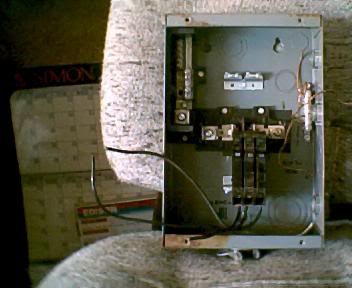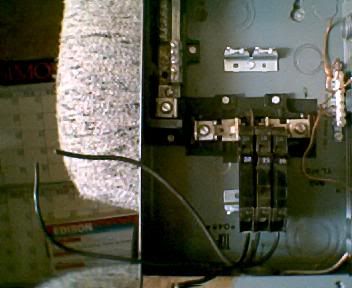Re: Electrical breaker box and wiring question
Originally posted by brother chris:<br /> <br />I am going with 20amp wire and 20amp breaker box. I hope this will work....it should....I think.
This entire thread just sorta scares me. This is going to come across rather harsh, and I honestly mean no disrespect, but based on your questions it appears you don't have a lot of knowledge of electrical wiring. 15 amp branch circuits have little or no business in any home or trailer and shouldn't even be considered. so I'm glad you're upsizing to 20 amp box & wires, and you may be OK, but your questions are very vague and it's impossible for anyone here to know for sure how to advise you....there's math formulas written to determine max loads on a branch circuit, special grounding and wiring requirements for trailers, and you may be very limited on how much you can draw by the main feed wires coming into the trailer...it's been asked a couple times here but I haven't seen your answer yet...what gauge are the feed wires coming into the box? And how big is the breaker on the other end? THIS INFORMATION IS CRITICAL. <br /><br />Also, the gallon size of your water heater has nothing to do with the amount of current it draws. Being a 240V, I can pretty well guarantee you that 12 guage (20 amp max) wire is NOT going to be sufficient to feed a water heater safely. You will most likely need 10 gauge or larger for the water heater circuit. If you undersize ANY wire it will get hot, and your trailer may burn to the ground.<br /><br />If this were a house, code would likely require a dedicated circuit for 1. Fridge, 2. Bathroom (GFCI), 3. Bathroom lighting, 4. Bedroom (AFCI), 5. Kitchen counters, 6 and 7. General lighting and outlets, 8 and 9. 240 volt hot water heater. So I believe you need at least 9 spaces but I could be wrong on this (most likely I've missed something as I admit my knowledge of codes is not real current.) Will you have a microwave? If yes, usually a dedicated circuit is recommended. That makes 10 circuits. And people in trailers often want space heaters in the winter, but I don't know your situation. Does this trailer have heat? A/C? From the little you've described, I'd guestimate you'll want at least 60 amp service....and that's why the incoming wire size and breaker size is so important. To further complicate things, how LONG is the feed wire? Voltage drop may be an issue if it's a fairly long run from the main. If I were wiring this myself for a family member, I'd probably consider running 100 amps to it with a 20 space box. The extra up-front cost is minimal.<br /><br />Obviously that all sounds like MASSIVE overkill, and it might be. Afterall, it's just a travel-trailer. But current is current, and wires can only handle so much current before they start to overheat...that's the most important thing to understand.<br /> <br />Electrical codes are not written just to make things difficult and expensive...they're written to prevent death. I really feel you should be hiring a licensed electrician to do the work. That way this trailer will be less likely to burn to the ground in the middle of the night.<br /><br />I sincerely wish you the best in your project, but elecricity needs a LOT of respect. If you still want to go forward with doing this yourself as I imagine you will, I urge you to go to the library and check out a copy of the NEC (National Electric Code) and study it at length...even an outdated copy will get you in the ballpark for safety although it won't guarantee local code compliance which is usualy more stringent than the NEC. If it confuses you (and it will confuse you) start asking specific questions about what you don't understand.<br /><br />EDIT: I just read your profile...I see you're in Canada (I know DUH...I shoulda known by your signature!!

) Everything I wrote refers to the United States. But I imagine Canadian codes are similar because the laws of physics are certainly the same. I'm not sure what the Canadian equivalent of the NEC is...but I'm sure it exists.





















